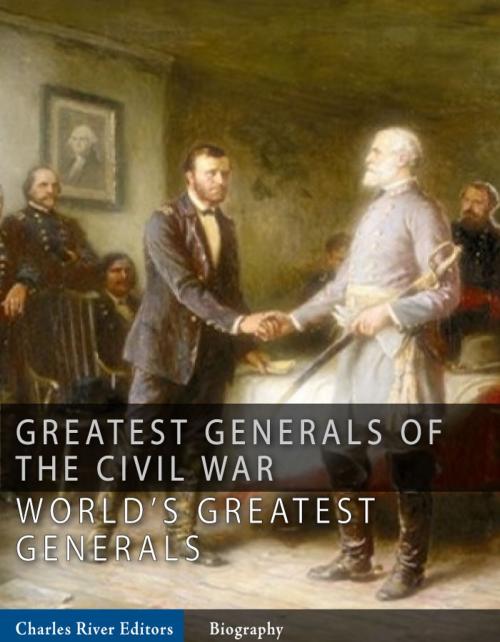The Greatest Generals of the Civil War: The Lives and Legends of Robert E. Lee, Stonewall Jackson, Ulysses S. Grant, and William Tecumseh Sherman
Nonfiction, History, Americas, United States, Civil War Period (1850-1877), 19th Century, Biography & Memoir, Historical| Author: | Charles River Editors | ISBN: | 9781475316117 |
| Publisher: | Charles River Editors | Publication: | July 12, 2012 |
| Imprint: | Language: | English |
| Author: | Charles River Editors |
| ISBN: | 9781475316117 |
| Publisher: | Charles River Editors |
| Publication: | July 12, 2012 |
| Imprint: | |
| Language: | English |
*Includes pictures of each general and important people, places, and events in their lives.*Includes an introduction for each general*Includes a Table of Contents*Includes bibliographies for each generalDespite the fact that the Civil War began over 150 years ago, it remains one of the most widely discussed topics in America today, with Americans arguing over its causes, reenacting its famous battles, and debating which general was better than others.Americans continue to be fascinated by the Civil War icons who made the difference between victory and defeat in the war's great battles. Within the pantheon of Civil War greats are the Confederacy's Robert E. Lee and Stonewall Jackson, and the Union's Ulysses S. Grant and William Tecumseh Sherman.With the exception of George Washington, perhaps the most famous general in American history is Robert E. Lee (January 19, 1807 October 12, 1870), despite the fact he led the Confederate Army of Northern Virginia against the Union in the Civil War. Lee is remembered today for constantly defeating the Unions Army of the Potomac in the Eastern theater from 1862-1865, considerably frustrating Lincoln and his generals. His leadership of his army led to him being deified after the war by some of his former subordinates, especially Virginians, and he came to personify the Lost Causes ideal Southern soldier. His reputation was secured in the decades after the war as a general who brilliantly led his men to amazing victories against all odds. Thomas Jonathan Jackson is one of the most famous generals of the Civil War, but many of the people he continues to fascinate probably dont remember his whole name. Thats because Jackson earned his famous Stonewall moniker at the First Battle of Manassas or Bull Run, when Brigadier-General Bee told his brigade to rally behind Jackson, whose men were standing like a stone wall. Ironically, its still unclear whether that was a compliment for standing strong or an insult for not moving his brigade, but the nickname stuck for the brigade and the general itself. Many still wonder how the outcome of Gettysburg or the Civil War itself may have changed if Jackson had not been mortally wounded at Chancellorsville.While all eyes were fixed on the Eastern theater at places like Manassas, Richmond, the Shenandoah Valley and Antietam, Ulysses S. Grant went about a steady rise up the ranks through a series of successes in the West. His victory at Fort Donelson, in which his terms to the doomed Confederate garrison earned him the nickname Unconditional Surrender Grant, could be considered the first major Union victory of the war, and Grants fame and rank only grew after that at battlefields like Shiloh and Vicksburg. William Tecumseh Sherman (February 8, 1820 February 14, 1891) holds a unique position in American history. Synonymous with barbarity in the South, Sherman is lauded as a war hero in the North, and modern historians consider him the harbinger of total war. As a General in the Union Army during the American Civil War (186165), Sherman was recognized for his outstanding command of military strategy but criticized for the harshness of the "scorched earth" policies that he implemented in conducting total war against the Confederate States, especially in 1864 and 1865. Military historian B. H. Liddell Hart famously declared that Sherman was "the first modern general." Along with pictures of the generals and important people, places, and events in their lives, you will learn about the Civil War's greatest generals like you never have before, in no time at all.
*Includes pictures of each general and important people, places, and events in their lives.*Includes an introduction for each general*Includes a Table of Contents*Includes bibliographies for each generalDespite the fact that the Civil War began over 150 years ago, it remains one of the most widely discussed topics in America today, with Americans arguing over its causes, reenacting its famous battles, and debating which general was better than others.Americans continue to be fascinated by the Civil War icons who made the difference between victory and defeat in the war's great battles. Within the pantheon of Civil War greats are the Confederacy's Robert E. Lee and Stonewall Jackson, and the Union's Ulysses S. Grant and William Tecumseh Sherman.With the exception of George Washington, perhaps the most famous general in American history is Robert E. Lee (January 19, 1807 October 12, 1870), despite the fact he led the Confederate Army of Northern Virginia against the Union in the Civil War. Lee is remembered today for constantly defeating the Unions Army of the Potomac in the Eastern theater from 1862-1865, considerably frustrating Lincoln and his generals. His leadership of his army led to him being deified after the war by some of his former subordinates, especially Virginians, and he came to personify the Lost Causes ideal Southern soldier. His reputation was secured in the decades after the war as a general who brilliantly led his men to amazing victories against all odds. Thomas Jonathan Jackson is one of the most famous generals of the Civil War, but many of the people he continues to fascinate probably dont remember his whole name. Thats because Jackson earned his famous Stonewall moniker at the First Battle of Manassas or Bull Run, when Brigadier-General Bee told his brigade to rally behind Jackson, whose men were standing like a stone wall. Ironically, its still unclear whether that was a compliment for standing strong or an insult for not moving his brigade, but the nickname stuck for the brigade and the general itself. Many still wonder how the outcome of Gettysburg or the Civil War itself may have changed if Jackson had not been mortally wounded at Chancellorsville.While all eyes were fixed on the Eastern theater at places like Manassas, Richmond, the Shenandoah Valley and Antietam, Ulysses S. Grant went about a steady rise up the ranks through a series of successes in the West. His victory at Fort Donelson, in which his terms to the doomed Confederate garrison earned him the nickname Unconditional Surrender Grant, could be considered the first major Union victory of the war, and Grants fame and rank only grew after that at battlefields like Shiloh and Vicksburg. William Tecumseh Sherman (February 8, 1820 February 14, 1891) holds a unique position in American history. Synonymous with barbarity in the South, Sherman is lauded as a war hero in the North, and modern historians consider him the harbinger of total war. As a General in the Union Army during the American Civil War (186165), Sherman was recognized for his outstanding command of military strategy but criticized for the harshness of the "scorched earth" policies that he implemented in conducting total war against the Confederate States, especially in 1864 and 1865. Military historian B. H. Liddell Hart famously declared that Sherman was "the first modern general." Along with pictures of the generals and important people, places, and events in their lives, you will learn about the Civil War's greatest generals like you never have before, in no time at all.















